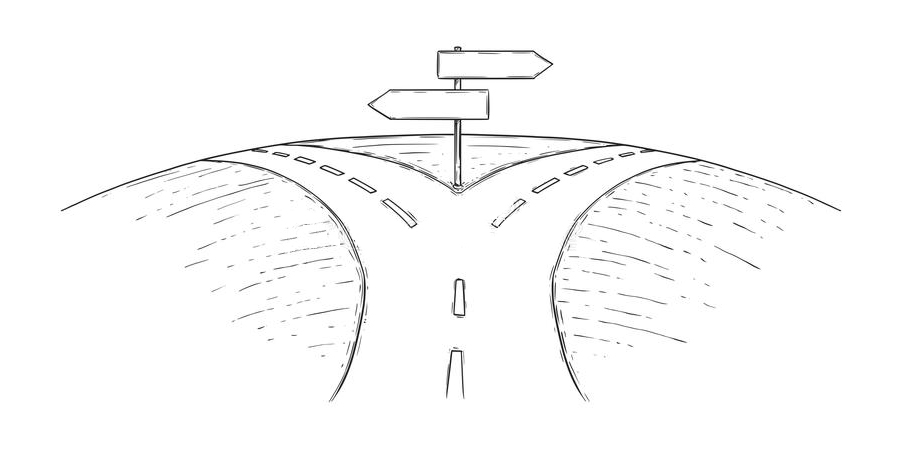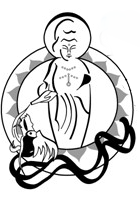It is common to hear the outcome of events being described as being the result of fate, destiny or sometimes a result of both.
But fate and destiny are not just concepts with an entertainment value, these ideas point to serious issues of great interest in a number of important areas such as: philosophy, theology, physics, psychology, and, of course, biology.
According to an online Greek translation service (Craine, 2004), fate and destiny in ancient Greek came from exactly the same word: moira. This may suggest that the ancients saw little or no difference between the terms in their own times. In Latin, the word for fate is fatum and derives from the verb meaning “to speak.” Bollas (1989) notes that a fatum is a prophecy and that a fatus is an oracle. This definition centers on the fact that most knowledge of one’s fate came through a verbal statement or riddle. Destiny comes from the Latin word Destinare and means “to fasten down, secure or make firm” (Bollas, 1989). Rollo May (1981) states that destiny means “to ordain, to devote, to consecrate” and is connected to the word destination, suggesting that destiny includes both a direction and a plan. Bollas states that “[D]estiny is linked to actions rather than words. If fate emerges from the word of the gods, than destiny is a preordained path that man can fulfill”
Greek Mythology
The ancient Greeks had a strong sense of fate and destiny that appeared frequently in their myths. A person might learn about one’s fate in one of two ways. First, the three Fates were depicted as three old, but godlike, women called the Moirae. The Moirae could appear directly to the person’s parents and create the destiny of the child prior to or just after their birth. The first Fate was named Clotho meaning “spinner.” She spun the thread of each individual’s life and determined the complexities and major features of that life. Lachesis, the second Fate, measured the length of the life. Her name means “distributor of fortunes” as in a long or short life. The third Fate was named Atropos meaning “inflexible.” She was the most feared since she cut the threads of the mortal lives (Rosenburg & Baker, 1992). In general, the fates decided what type of life (e.g. glorious or quiet) a person would have, how long that life would be and how death would come (e.g. tragic or peaceful) to that person.
The myth of Meleager is one example of a direct appearance made by the Moirae. The three Fates appear to his mother shortly after his birth. Atropos told his mother that Meleager’s life would share the fate of a log that Atropos placed on the fire. The Fates disappeared; the mother pulled the log off the fire and saved it for years until in a fit of rage she burned it to avenge the death of her brothers at her son’s hands. When the log burned out, Meleager also turned to ash (Rosenburg & Baker, 1992). Yet, as will be discussed later, the ancient Greeks did not see life as being completely predetermined.
The second, and more prevalent, way to learn about one’s fate would be through visiting an oracle. The oracle was a mediator between the gods and humans. The oracle did not reveal all the information supposedly woven by the three Fates, but rather it would answer questions about certain parts of the thread of life or about specific situations. Berofsky (1966) suggests that an oracle could only interpret major life events: any important personal project, any event significant to humanity as whole and any action that a person anxiously deliberates about. Morford and Lenardon (1985) write that some tablets found at a temple for Zeus demonstrate that ordinary people often asked the oracle for Zeus’ help on issues such as: “to what god or hero they should pray or sacrifice for their common good; others ask if it is safe to join a federation; a man inquires if it is good for him to marry; another, whether he will have children from his wife”. The every day ordinary life events of the ancients apparently were not controlled by fate, only the big things.
The ambiguous answer from the oracle also reveals something more general about human nature. Human beings have a strong desire for pre-knowledge of events, but they are apparently not equipped to handle such divine knowledge. The pre-knowledge of events causes the human being, more often than not, to self-destruct. Knowing one’s fate seems to lead down one of two bad paths. If one interprets the message in a personally positive direction then this tends to lead to overconfidence, poor planning, and tragic decision-making. If fate is interpreted in a negative direction, anxiety about future events occurs (e.g. Oedipus), which ironically spurs the human being to try to avoid the fated bevent. Ultimately, however, one’s actions bring the event to fruition. In most cases, it appears that human beings are better off not knowing their fate. In addition to testing the heart and mind of the seeker, fate also has a few other purposes. First, fate is used to explain how bad things happen to good people or vice versa.
Fate is also used to account for the often-unintelligible mystery of human fortune. Similarly, today we might say that a horrendous act was the result of “God’s will” or that the innocent victim was in the “wrong place at the wrong time.” The ancient Greeks, like contemporary humanity, ascribe to fate the apparent senseless act of violence and tragedy that defy reason. Second, the Fates also are responsible for “serving justice” on both small and large scales. For example, fate would be summoned to punish a person who had offended, cheated, and insulted others but had somehow escaped human justice (Kitto, 1951). The Fates were often prayed to by the victim and asked to make some kind of retribution toward the perpetrator for the offensive behavior. The modern equivalent can be found in such statements as “What goes around comes around”, or “He’ll get his.”
Over time many ancient Greek intellectuals became dissatisfied with mythological explanations for the universe and, in particular, with the immoral behavior of the gods (Kirk, 1974). These thinkers began to move away from the terms fate and destiny, and they began to look for “causes.” However, soon these thinkers concluded that the cause of every event also had a preceding cause. Berofsky (1966) writes that, in general, the pre-Socratic philosophers “emphasized the unity or universal government of nature, while at the same time de-emphasizing or eliminating in part the anthropomorphizing form this conception took” . Nature to these Greeks was not “mother nature,” who provides and cares for the people of the earth, but rather the disinterested elements of air, fire, earth, and water. Human beings were also composed of these elements, and therefore, they were also controlled by the forces of nature. Kitto (1951) adds, “Above all, the Greeks refused, ultimately, to distinguish between Nature and human nature. The powers that rule the physical universe rule the moral universe”. Just as fire could be used constructively for warmth and light, or destructively to burn a structure down, a human being could also be morally constructive or immorally destructive.
Descent of the Soul
From heaven to earth. According to Plotinus, “there is no need of anyone to send (the soul) or bring it into body at a particular time”. For Plotinus, the descent of the soul is in a way comparable to that of a falling stone in the sense that, metaphorically at least, the law of fate is in the soul like a weight and the soul is falling in accordance with it. The weight of the soul is here a way to describe the soul’s natural movement: the soul’s descent is natural because it is in accordance with its own natural movement, exactly as the fall of a stone is in accordance with its heavy nature.
It is remarkable to see here Plotinus making his the analogy the Stoics made before him between animate beings and inanimate things (cf. T8 and 9). Like the Stoics, he is not afraid of being criticized for blundering the boundaries between the two because he is holding a conception of human responsibility that is not exclusive of fate: the souls descend into bodies, do it according to their own motion, and are therefore responsible for it; but their descent is not a movement escaping the grip of the laws of fate, and in this respect it should be described also as necessary. Indeed, as we now know, for Plotinus, “necessity contains the voluntary”.
First, says Plotinus, the descent is not the result of an “involuntary” motion on the part of the soul. If so, the soul could not be held responsible for it and what happens to the soul (the experience of the descent) would be an injustice. Second, the descent is not either the result of God sending the souls. If so, not only would the souls not be responsible and the experience of the descent an injustice, but the one to blame for such an injustice would be no one else but God. Such an explanation would not only be impious, but also contradict Plato who insists that God is in fact anaitios. If the soul is to be held responsible for the descent, the descent must be voluntary.
The descent of a soul into a body is comparable, Plotinus says, to the taking place of the various stages of the generation of a living being: it is produced at “its appointed time”, time that is fixed and determined by the nature of the living being. Exactly as a human being will, at a given time (namely puberty), experience sprouting of beard, sexual impulse and even spots, the descent is an event that happens to the soul at some predetermined moment. The predetermined nature of the descent is the result of the internalization of fate. What is peculiar with nature is that its movement is produced from within and this is exactly what Plotinus wants to show regarding the descent: first, that the reason for the descent is to be found within the soul, hence that the soul is responsible for it; second, that the descent is a natural movement, hence that it does not exclude necessity.
Plato also rejected the teaching of traditional myth because of the poor moral conduct of the gods. The fact that the gods had such base desires and lacked virtuous behavior seemed to him to be an anthropomorphizing of man rather than a divine truth. Despite rejecting myths of Homer, Plato does keep the concept of fate along with the ability to make some choice about one’s fate. The Myth of Er, in the last book of Plato’s Republic includes Socrates and Glaucon discussing the afterlife when fate is chosen (Morford & Lenardon, 1985). After death, a soul has a gestation period of about a thousand years in either agony or happiness–depending on one’s previous life–then souls are brought before the Fates again. Here, a prophet casts lots to the souls. The lots each have a number on it and this number represents the order in which the souls will choose their next life. The souls then pick their next life from a series of vignettes placed before them. The available lives are for various animals and humans of differing statuses: “Among them lives of tyrants, some complete, others cut short and ending in poverty, exile, and destitution.
Similar to the prophecy of Greek mythology the vignettes were ambiguous and lacked exact detail. “The disposition of the soul was not included, because with [the soul’s] choice of another life it too of necessity became different, but the other qualities were mixed with one another, wealth and poverty, sickness and health, and intermediate states” (Morford & Lenardon, 1985, p. 260). Thus, all the wisdom one’s soul had gathered from the previous life must be utilized to pick a new life; a soul’s choice had to take into account what is available at the time and to understand the potential and weakness of each life so that the soul does not pick a worse life. “By the worse life I mean that leading the soul to become more unjust, by the better, that leading it to become more just” (Morford & Lenardon, 1985, p. 261). The prophet reminds the souls that everyone has the chance for a good life, even the person choosing last.
Rollo May (1981), an existential psychologist, defines destiny as “the patterns of limits and talents that constitute the ‘givens’ in life. . . [It is in] the confronting these limits that our creativity emerges. . . [and] we can choose how we shall respond”. The givens of life apply to people on at least four different levels according to May: first, a cosmic level in which our birth is not chosen and the time of our unavoidable death is not known to us; second, a genetic level in which we have no choice over our gender, race, body features, and talents; third, a cultural level in which we have no control over what type of family, economic class, historical time period or language into which we are thrown; finally, there is a circumstantial level in which events beyond our control—such as wars, economic depressions, and Zeitgeists— influence our choices.
Rollo May (1981) believes that destiny is understood only in relation to grades of freedom. He puts Fate on the opposite end of Talent on a spectrum of Destiny. Fate stands for the events that a person has absolutely no control over. In the middle is the unconscious mind that is “partly determined and partly uninfluenced by human activity.” (May, 1981, p. 90). At the opposite end is talent, which is given but comes with a great deal of freedom in how it is used. May believes that we are not completely free, nor are we completely determined, but that freedom and determinism give birth to each other. Certain actions and decisions bring us more freedom, others restrict our freedom. He writes, “[W]hen we gain enough freedom to get new insights, new visions, we will be attacked by the anxiety that accompanies freedom. . . this is the curse and the blessing of being human that we are free but destined at the same moment”. Fate is that which cannot be changed about a person, such as gender and race.
This article is a summary from:
- Fate and destiny: Some historical distinctions between the concepts ( Article in Journal of Theoretical and Philosophical Psychology · January 2006 )
- Plotinus on the Descent of the Soul – Draft version II (2014) Bernard Collette-Dučić!




